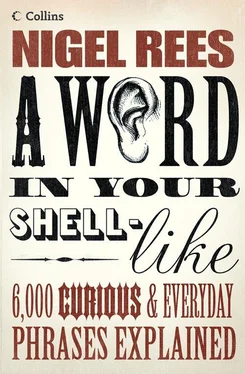A Word in Your Shell-Like
6,000 Curious & Everyday Phrases Explained

Cover Page
Title Page A Word in Your Shell-Like 6,000 Curious & Everyday Phrases Explained
Epigraph ‘Thou art a retailer of phrases, and dost deal in remnants of remnants’ William Congreve, The Way of the World (1700) ‘False English, bad pronunciation, old sayings and common proverbs; which are so many proofs of having kept bad and low company’ 4th Earl of Chesterfield, A dvice to his Son on Men and Manners (1775) ‘Sir, it [an earthquake] will be much exaggerated in popular talk; for, in the first place, the common people do not accurately adapt their thoughts to the objects; nor, secondly, do they accurately adapt their words to their thoughts: they do not mean to lie; but, taking no pains to be exact, they give you very false accounts. A great part of their language is proverbial, If anything rocks at all, they say it rocks like a cradle ; and in this way they go on’ Samuel Johnson, quoted in James Boswell, The Life of Samuel Johnson (1791) – for 14 September 1777 ‘Blank cheques of intellectual bankruptcy’ A definition of catchphrases attributed to Oliver Wendell Holmes (1809–94) ‘What do I mean by a phrase? A clutch of words that gives you a clutch at the heart’ Robert Frost, interviewed in the Sat urday Evening Post (16 November 1960)
Introduction
Abbreviations
A
B
C
D
E
F
G
H
I
J
K
L
M
N
O
P
Q
R
S
T
U
V
W
X
Y
Z
Acknowledgements
About the Author
Copyright
About the Publisher
‘Thou art a retailer of phrases, and dost deal in remnants of remnants’
William Congreve, The Way of the World (1700)
‘False English, bad pronunciation, old sayings and common proverbs; which are so many proofs of having kept bad and low company’
4th Earl of Chesterfield, A dvice to his Son on Men and Manners (1775)
‘Sir, it [an earthquake] will be much exaggerated in popular talk; for, in the first place, the common people do not accurately adapt their thoughts to the objects; nor, secondly, do they accurately adapt their words to their thoughts: they do not mean to lie; but, taking no pains to be exact, they give you very false accounts. A great part of their language is proverbial, If anything rocks at all, they say it rocks like a cradle ; and in this way they go on’
Samuel Johnson, quoted in James Boswell, The Life of Samuel Johnson (1791) – for 14 September 1777
‘Blank cheques of intellectual bankruptcy’
A definition of catchphrases attributed to Oliver Wendell Holmes (1809–94)
‘What do I mean by a phrase? A clutch of words that gives you a clutch at the heart’
Robert Frost, interviewed in the Sat urday Evening Post (16 November 1960)
A Word in Your Shell-like is an extensive examination of more than 6,000 phrases, detailing their origins, dates, meanings and use. But what is a ‘phrase’? Although it is technically possible for a phrase to consist of one word, I have mostly limited myself to clusters of two or more words and left analysis of single words to the etymologists and lexicographers. Within this definition of a phrase, however, fall idiomatic expressions, proverbial sayings, stock and format phrases, catchphrases, clichés, journalese, headline fodder, slogans, advertising lines, as well as titles of books and entertainments which either quote a specific source or themselves create a form of words. There is also a number of ‘short quotations’ – phrases derived from famous sayings that may be said to have a life of their own.
As to my choice of phrases for inclusion, I have simply concentrated on those about which there is something interesting to say with regard to their origins and use. I have not always restricted myself to phrases that have caught on in an enduring fashion – which might be the criterion for inclusion in a more formal dictionary – but I also look at phrases that may have had only a brief flowering. This is because to record them here may help to explain an allusion that might puzzle the reader of a novel or other work. In addition, even a briefly popular phrase can help to evoke a period and thus should be examined as part of the social history of the language.
These are the main types of phrase that I have explored in this book:
Catchphrase : simply a phrase that has ‘caught on’ with the public and is, or has been, in frequent use. It might have originated with a particular person – like CALL ME MADAM – or it might not be traceable to a particular source – like BACK TO THE DRAWING-BOARD!
Cliché : a worn or hackneyed phrase. There are some who would say that the clichés of journalism are used in such a way that they amount to a special language – journalese – which does not deserve to be condemned. I disagree.
Euphemisms : phrases used when you are trying to be gentle – or, in modern guise – when you are trying to be politically correct. The word ‘loophemism’ coined by Frank Deakin of Wilmslow in 1995 describes the largest number of such phrases in this book, having to do with going to the lavatory: (GO AND) SEE A MAN ABOUT A DOG.
Nannyisms : usually of a cautionary nature, these sayings may have been handed down by actual nannies or by grown-ups of a nannyish tendency: BACK IN THE KNIFE-BOX, LITTLE MISS SHARP.
Format phrase : a basic phrase or sentence structure capable of infinite variation by the insertion of new words – like ONE SMALL STEP FOR—, ONE GIANT LEAP FOR—where the sentence structure can be adapted to suit the speaker’s purpose.
Idiom : a picturesque expression that is used to convey a metaphorical meaning different from its literal one – or, as The Oxford Dictionary of Current Idiomatic English puts it, that has a meaning ‘not deducible from those of the separate words’. For example, if I say someone is a SQUARE PEG IN A ROUND HOLE it is obvious he or she cannot literally be such a thing. My hearers will know exactly what I mean, although I have not told them directly. Like the term ‘catchphrase’, ‘idiom’ could be applied to most of the phrases in this book, but I have tried to restrict its use to those that conform to the above definition.
Quotation, short : a number of phrases that are parts of quotations – e.g. WINTER OF DISCONTENT – are also included, especially when they have been used as the titles of popular books or films. Equally, when original phrases chosen as titles have become part of popular speech, they also are covered.
Saying, brief : this is what is sometimes called ‘a well-known phrase or saying’ (as in ‘re-arrange these words into a well-known phrase or saying’) but, unlike a formal ‘quotation’, is probably not attributable to a precise source, be it speaker, book or show. Proverbial expressions most commonly fall into this category.
Slogan : a phrase designed to promote a product, idea or cause – or which has this effect. However, at times I have employed it rather loosely to cover any phrase that is used in advertising – in headlines, footnotes, but not necessarily in a selling line that names the product. BODY ODOUR (or BO) could hardly be described as a slogan in itself, but as an advertising line it did help to promote a product.
Читать дальше













